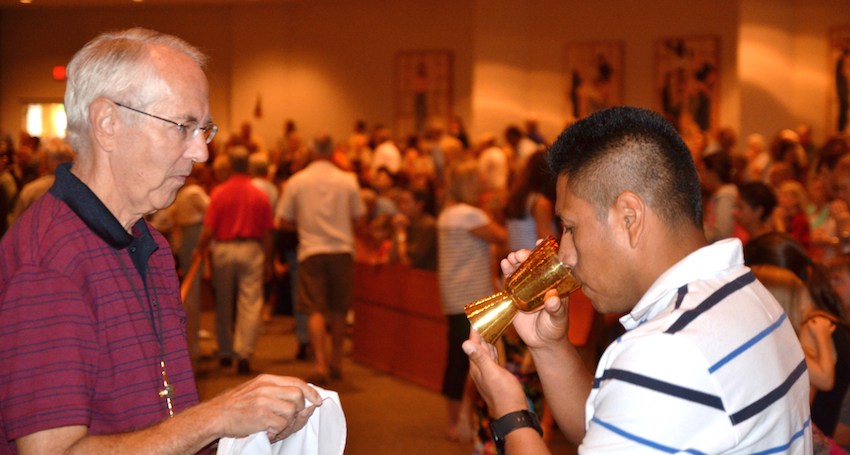
Unfortunately, this episode I’m flying solo! Nessa wasn’t able to make it so I thought it best to record on my own, rather than let another week pass without a new episode. In today’s episode I tackle the delicate subject of “Intercommunion” and explain why, under normal circumstances, the Eucharist is not given to non-Catholic Christians.
Episode 5: Intercommunion (Download)
Audio Player
— Notes —
* This episode was based on a two-part series I wrote a few years ago.
* I quote from two Early Church Fathers in this episode. The first is St. Justin Martyr:
“This food we call [the Eucharist], and no one is allowed to partake but he who believes that our doctrines are true, who has been washed with the washing for the remission of sins and rebirth, and who is living as Christ has enjoined… “
“…We do not receive these as common bread and drink. For Jesus Christ our Saviour, made flesh by the Word of God, had both flesh and blood for our salvation. Likewise, we have been taught that the food blessed by the prayer of his word…is the flesh and blood of Jesus who was made flesh.”
– Justin Martyr, First Apology, Chapter 66 (~ AD 150)
* The second Father I quote is St. Ignatius of Antioch:
“They abstain from the Eucharist and from prayer, because they do not confess the Eucharist is the flesh of our Saviour Jesus Christ, which suffered for our sins, and which the Father, in His loving-kindness, raised from the dead”
– Ignatius of Antioch, Letter to the Smyrnaeans, Chapter 7 (~AD 97)
* I also quote from a portion of one of St. Paul’s letters:
“Whoever, therefore, eats the bread or drinks the cup of the Lord in an unworthy manner will be guilty of profaning the body and blood of the Lord. Let a man examine himself, and so eat of the bread and drink of the cup. For any one who eats and drinks without discerning the body eats and drinks judgment upon himself. That is why many of you are weak and ill, and some have died”
– 1 Corinthians 11:29–30
* The Spiritual Communion prayer I quote is as follows:
“My Jesus, I believe that You are present in the Most Holy Sacrament. I love You above all things, and I desire to receive You into my soul. Since I cannot at this moment receive You sacramentally, come at least spiritually into my heart. I embrace You as if You were already there and unite myself wholly to You. Never permit me to be separated from You. Amen”
Please subscribe to this podcast using iTunes and Google Play and if you have any feedback or would like to pose a question for an upcoming episode, you can send us a message from the website or tweet us at @davidandnessa.





